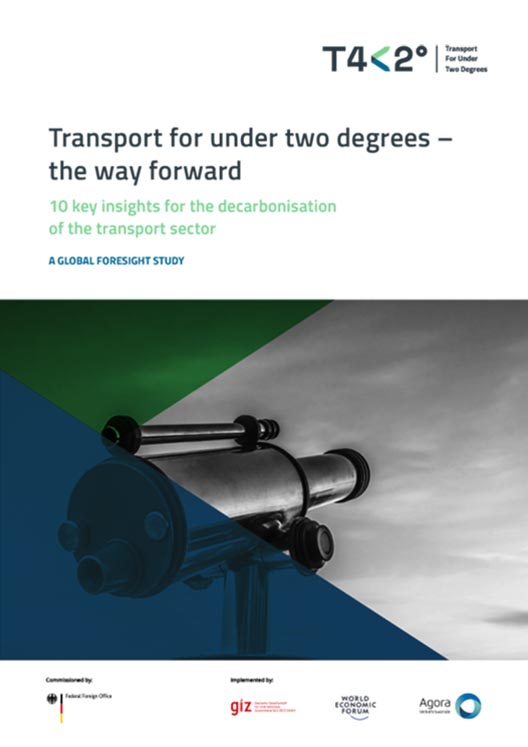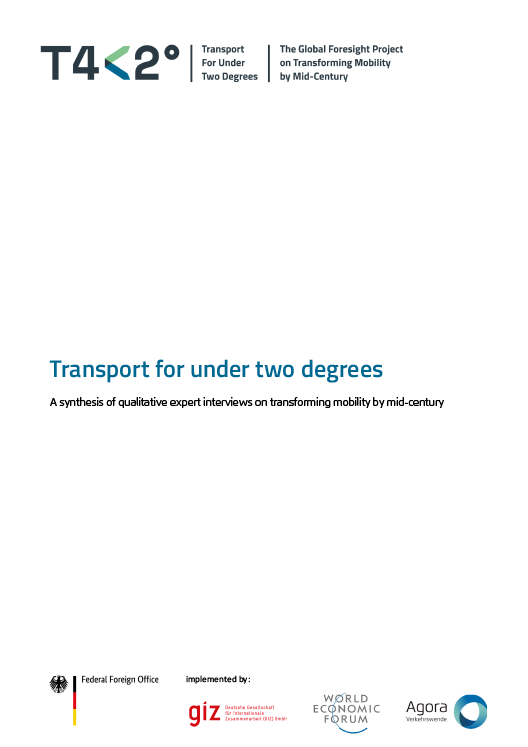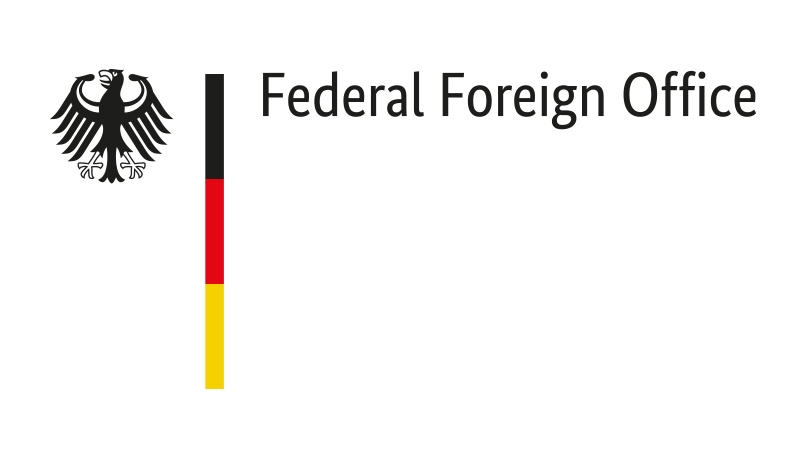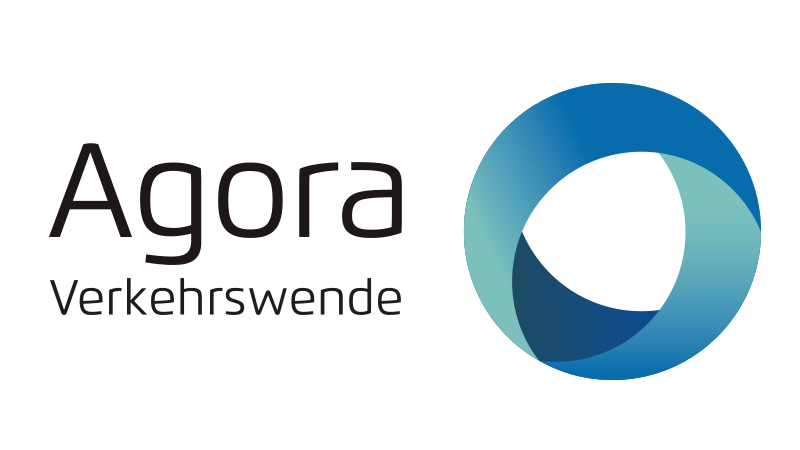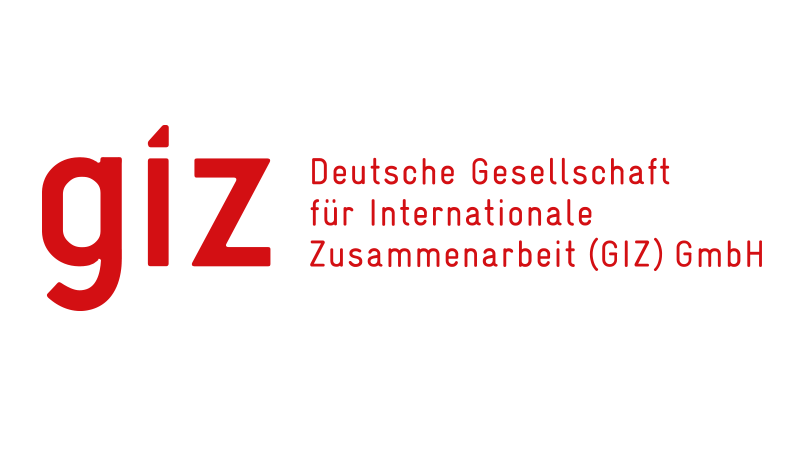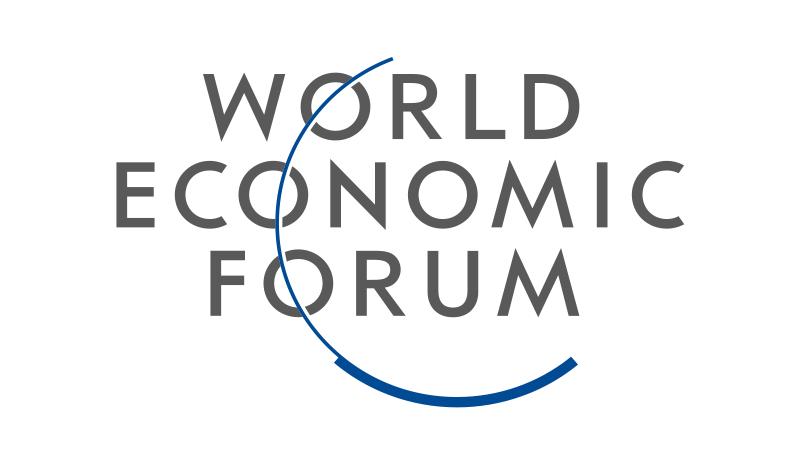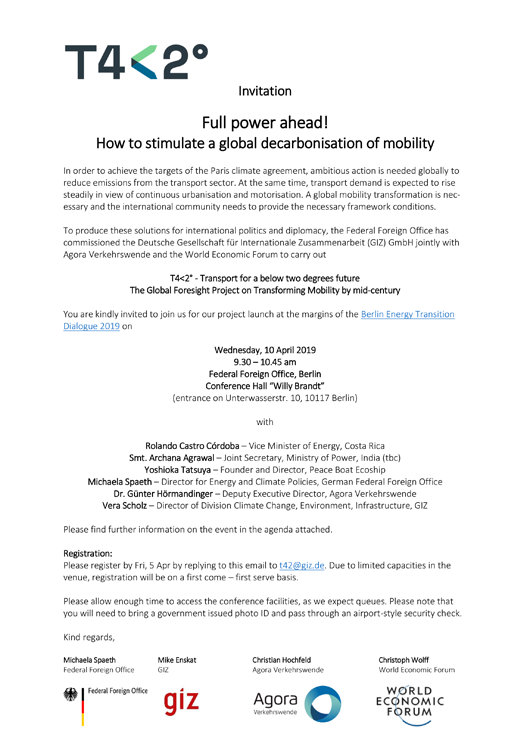The foresight study provides ten key insights
Publications
Transport for under two degrees – the way forward
10 key insights for the decarbonisation of the transport sector
A synthesis of qualitative expert interviews on transforming mobility by mid-century
The transport sector is the fastest growing source of greenhouse gas emissions at present. It accounts for approximately one quarter of global greenhouse gas emissions and hence figures prominently in efforts to transform the energy economy and protect the climate. Without a scaled-up global mitigation effort, it will not be possible to reach the climate targets of the Paris Agreement. A low-carbon transformation of the global transport sector is the next necessary step in the global energy transformation.
Germany’s Federal Foreign Office has commissioned the project “T4<2° - Transport for under two degrees”, a global foresight study on the decarbonisation and transformation of the transport sector to identify challenges and opportunities for a sustainable, low-carbon transport sector. The findings provide decision-makers with a clear vision and specific recommendations on how to achieve decarbonisation of the sector and orchestrate international efforts for a global transport system transformation.
Authors: Christian Hochfeld (Agora Verkehrswende), Marena Pützschler (Agora Verkehrswende), Matthias Wanko (Agora Verkehrswende), Alexander Jung (Agora Verkehrswende until 02/2020), Mike Enskat (GIZ), Cornelia Hörtner (GIZ), Christian Mettke (GIZ), Johannes Uhl (GIZ), Mark Major (Growing Markets), Stefanie Sohm (Growing Markets), Christoph Wolff (WEF), Mary Loane (WEF)
Release date: 10/2020
Number of pages: 76
Download: A Global Foresight Study - PDF (2,5 MB)
Download: Policy Brief - PDF (1,1 MB)
Transport for under two degrees
Transport for under two degrees
A synthesis of qualitative expert interviews on transforming mobility by mid-centuryThis interim report displays some preliminary results from the first of the three project phases and sums up the most prominent insights from the interviews with more than 60 international experts.
Release date: 10/2019
Number of pages: 19
Download - Interim Report: PDF (2,0 MB)
About the Project
T4<2° Transport For Under Two Degrees
Project Background
Responsible for approximately one-quarter of the world’s greenhouse gas emissions, the transport sector is one of the largest consumers of energy worldwide. Accordingly, the transport sector necessarily figures prominently in efforts to transform the energy economy and protect the climate. At the same time, by enabling the mobility of goods and people, the transport sector fulfils a crucial economic and societal role.
Most of today’s transport-related greenhouse gas emissions are produced in G20 countries. But the transport systems of emerging and developing nations are currently undergoing rapid growth and soon their emissions will be rising faster than those of industrialised countries. The OECD International Transport Forum estimates that by 2050, global transport emissions will grow by around 60 per cent unless immediate measures are taken. In the absence of such measures, the international community will fall dramatically short of the Paris Agreement’s 2015 goal of limiting global warming to well below 2°C.
The transport sector thus plays a major role in clean-energy initiatives and government actions to fight climate change. Yet protecting the climate is just one part of the equation. Ongoing urbanization has left cities all around the world with massive levels of congestion that have brought transport systems quite literally to a halt. Meanwhile, a lack of mobility options in rural areas has imperilled societal and economic growth. New digital technologies will provide some solutions but they will also bring disruptive changes. Addressing them represents an unprecedented political undertaking, one whose scope goes well beyond the transport sector. The geopolitical reconfigurations and shifts in global power that may result will themselves pose new challenges to transforming mobility.
Project Description
Germany’s Foreign Office commissioned the project T4<2° to develop global recommendations that promote a sustainable climate-friendly transport sector. The project will be carried out by the Deutsche Gesellschaft für Internationale Zusammenarbeit (GIZ), the World Economic Forum (WEF) and Agora Verkehrswende.
The project partners will develop recommendations with strategic foresight methods in a three-stage process. Based on a qualitative survey of an international and interdisciplinary group of 60 to 80 experts, the participating researchers will formulate hypotheses about potential developments in the transport sector and their interactions with politics and other areas of the economy (transport, energy, housing, manufacturing, employment, national security). In a second step, the researchers will employ a Delphi technique to verify their hypotheses with around 500 international experts. In the third and final step, they will draw on their previous insights as they make deep dives into the context of selected countries and regions in order to develop location-specific recommendations.
Timeline and Milestones
- 04/2019: Project kick-off at the Berlin Energy Transition Dialogue 2019 in Berlin
- 05/2019: Project Presentation at the International Transport Forum Summit 2019 in Leipzig
- 04 to 06/2019:Project phase 1: Context Mapping with 60 to 80 international and interdisciplinary experts
- 07 to 08/2019: Project phase 2: Delphi survey with 500 international and interdisciplinary experts
- 07/2019: Project presentation at the WEF Annual Meeting of the New Champions in Dalian (“Summer Davos”)
- 10/2019 to 08/2020: Project phase 3: Regional deep dives in selected countries and regions
- 08/2020: Publication of Project Report
- 09/2020: Closing conference at the WEF Annual Meeting of the New Champions in Tianjin
Methods
T4<2° uses reliable methods of Strategic Foresight to develop policy recommendati ons for transforming mobility. Our research consists of three phases.
1. Context Mapping
In stage one, we will interview a transdisciplinary board of between 60 to 80 international experts surrounding the mobility transformation. These interviews will revolve around eight themes:
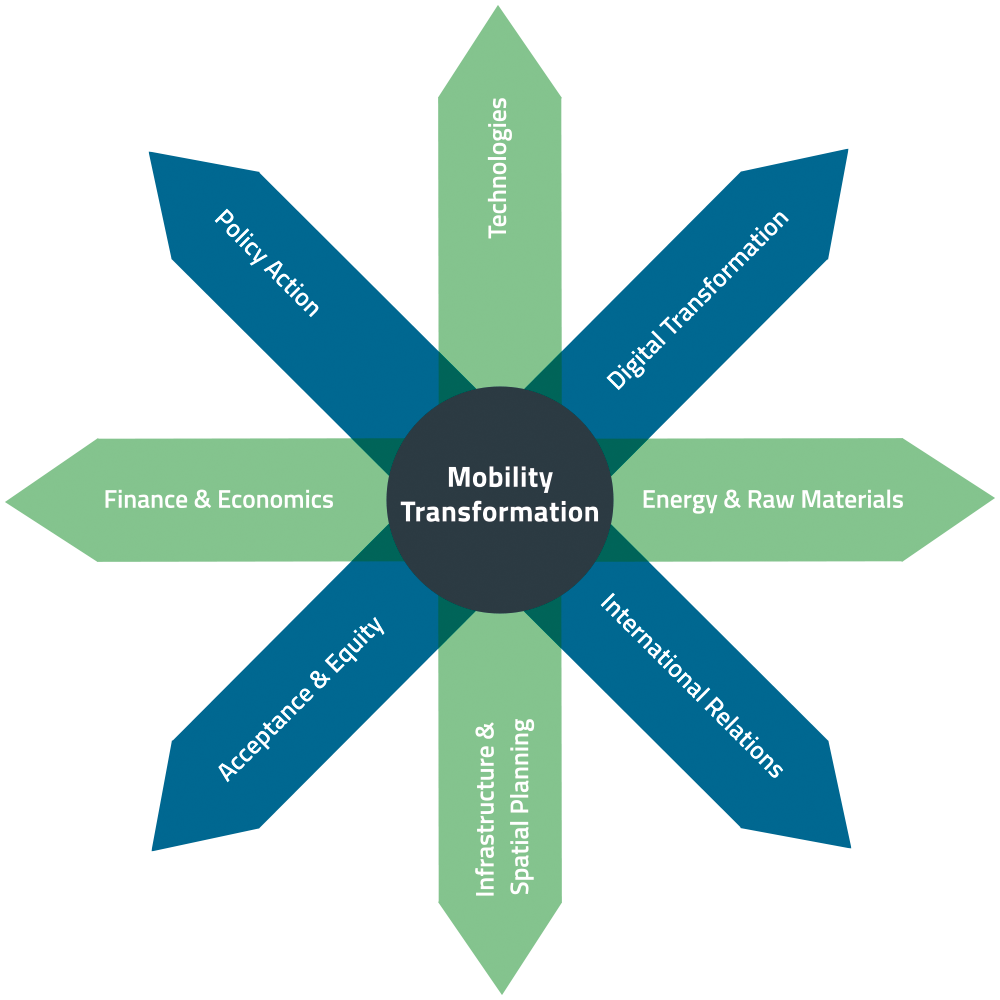
Through these interviews we seek to understand which issues the experts consider most important and the actions they deem most urgent in order to achieve a mobility transition. Based on our assessment, we will formulate hypotheses on trends in mobility and their potential interactions in different sectors and political arenas.
The questionnaire of the context mapping phase can be found here:
Context Mapping Questionaire (PDF 226 KB)
2. Delphi survey
In stage two, we will test our hypotheses by carrying out a Delphi survey of around 500 international experts. We will group their responses into different narratives and, on this basis, identify policy options and recommendations for decarbonizing the transport sector. A Delphi survey is a well-established tool for formulating assumptions about future developments in a certain topic. During such a survey, hypotheses are presented to a board of experts who are asked whether they agree with it. For the issues that prove to be most controversial, refined hypotheses will be formulated. Those will again be presented to the board of experts for assessment. The result of this process are well-founded assumptions about the future development of the sector. The questionnaires of the first and second round of the Delphi survey can be found here: Round 1 (PDF 226 KB) / Round 2 (PDF 228 KB)
3. Recommendations
Based on these assumptions we will develop policy recommendations to achieve a global mobility transformation towards decarbonisation. In order to so, workshops with experts will take place globally. A final report will present our findings and conclusions to the public.
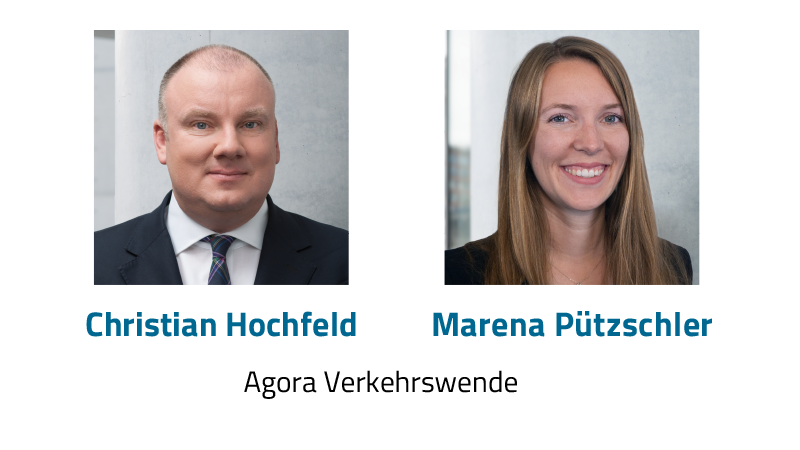
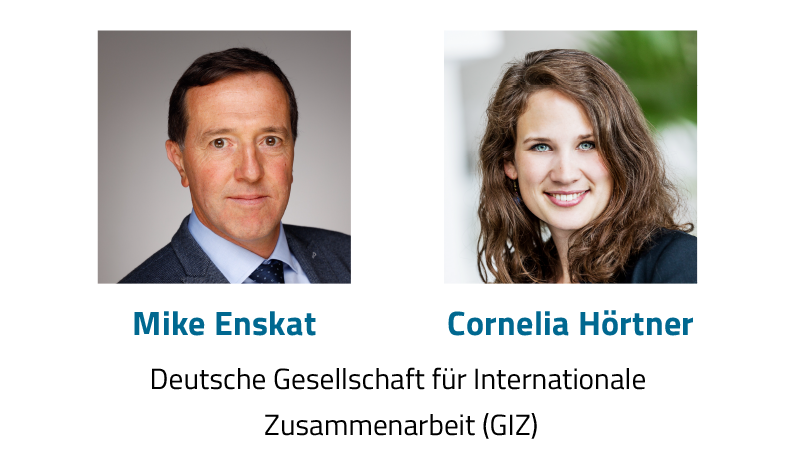
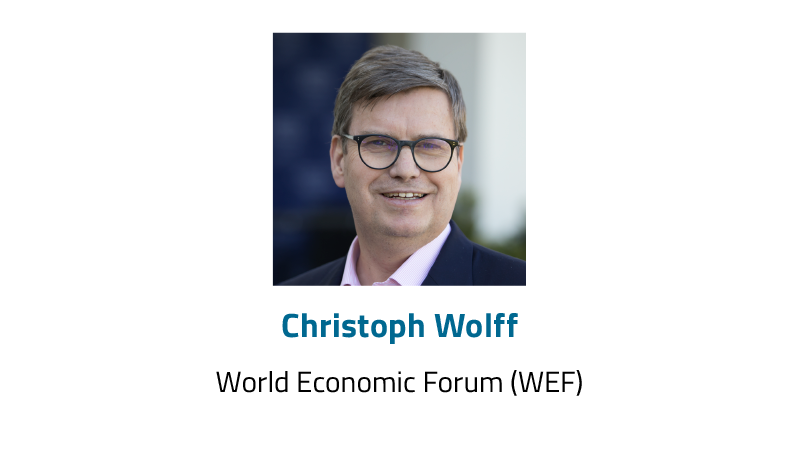
Events
Transport for under two degrees: The way forward?
The transport sector is the fastest growing source of greenhouse gas emissions at present. It accounts for approximately one quarter of global greenhouse gas emissions and hence figures prominently in efforts to transform the energy economy and protect the climate. Only through a scaled-up global mitigation effort will it be possible to reach the climate targets of the Paris Agreement.
The Covid-19 pandemic has shown that there is potential for swift systemic change within the mobility sector whilst at the same time highlighting certain weaknesses of the transport system.
How can a decarbonisation of the global transport sector be reached and how can international efforts be orchestrated successfully?
This event will present fresh results from the new foresight study “Transport for under two degrees: the way forward” commissioned by the German Federal Foreign Office and implemented by the deutsche Gesellschaft für internationale Zusammenarbeit (GIZ) GmbH, Agora Verkehrswende, and the World Economic Forum. About 300 international experts participated to give a rich depiction of necessary action and untapped potential to decarbonise transport and transform the transport system to become more sustainable and inclusive.
Joining the perspectives of the international, national, and local level, experts will comment the results and showcase best practices from their areas to jointly examine the necessary steps to create the mobility sector of the future.
Agenda
14:00 – 14:05 Welcome
Ambassador Hinrich Thoelken, Director for International Climate and Energy Policy and Digital Transformation, German Federal Foreign Office
14:05 – 14:20 Setting the scene
The role of international cooperation for a global transformation of transport:
- Achim Steiner, Administrator, United Nations Development Programme (video statement)
- Tanja Gönner, Chair of the Management Board, Deutsche Gesellschaft für internationale Zusammenarbeit (GIZ) GmbH (video statement)
14:20 – 14:50 Key insights for the decarbonisation of transport.
Results from “Transport for under two degrees: the way forward”.
- Mike Enskat, Head of Section for Energy, Water and Mobility, Deutsche Gesellschaft für internationale Zusammenarbeit (GIZ) GmbH
- Christian Hochfeld, Director, Agora Verkehrswende
- Christoph Wolff, Global Head of Mobility, World Economic Forum
14:50 – 15:30 Expert Statements
- Els de Wit, Programme Manager, Ministry of Transport, Public Works, and Water Management, Netherlands
- Om Prakash (O.P.) Agarwal, CEO, World Resource Institute, India
- Monica Araya, Transport Lead, Climate Champions
- Peter D. Norton, Associate Professor of Science, Technology, and Society, University of Virginia, USA
- Salma Mousallem, Programme Officer, UN-Habitat Egypt
15:30 – 15:45 Q&A with the Experts and the Audience
The event will be moderated by Lena Stiller, Transport Policy Advisor, Deutsche Gesellschaft für Internationale Zusammenarbeit (GIZ) Gmbh.
“Transport for under two degrees: the way forward?” – affiliated program of the Sustainable Development Impact Summit 2020 of the World Economic Forum
The Deutsche Gesellschaft für internationale Zusammenarbeit (GIZ) GmbH, Agora Verkehrswende, and the World Economic Forum warmly invite you to a discussion on
“Transport for under two degrees: the way forward?” as part of the Sustainable Development Impact Summit 2020 of the World Economic Forum.
Please find the MS Teams Link to join the event here.
Joining the perspectives of the international, national, and local level, the discussion shall unite politics and industry leaders to jointly examine and explain the necessary steps to create the mobility sector of the future, on how to achieve decarbonisation of the sector and orchestrate international efforts for a global transport system transformation. This event will moreover provide a first glimpse into the new foresight study “Transport for under two degrees: the way forward” commissioned by the German Federal Foreign Office and implemented by the Deutsche Gesellschaft für internationale Zusammenarbeit (GIZ) GmbH, Agora Verkehrswende, and the World Economic Forum, which will be published in October.
Agenda
14:00 – 14:05 Welcoming remarks
Ambassador Hinrich Thoelken, Director for International Climate and Energy Policy and Digital Transformation, Federal Foreign Office, German
14:05 – 14:20 Setting the scene
- „The role of international cooperation for a global transformation of transport”, Achim Steiner, Administrator, United Nations Development Programme
- „Transport for under two degrees: The way forward – a preview”: Christian Hochfeld, Executive Director, Agora Verkehrswende
- „Future of Transport – role of public-private collaboration“ Young-Tae Kim, Secretary General, ITF
- “Beijing practise on sustainable urban mobility” Jifu Guo, Director, Beijing Transport Institute
14:20 – 14:45 Discussion
chaired by Mike Enskat, Head of Energy – Water - Mobility, Deutsche Gesellschaft für internationale Zusammenarbeit (GIZ) GmbH
Panelists
- Monica Arraya, Transport Lead at Climate Champions, Costa Rica
- Felipe Calderón, Former President of Mexico
- Maruxa Cardama, General Secretary, SLOCAT
- Shirley Rodrigues, Deputy Mayor London, UK
Full power ahead! How to stimulate a global decarbonisation of mobility.
In order to achieve the targets of the Paris climate agreement, ambitious action is needed globally to
reduce emissions from the transport sector. At the same time, transport demand is expected to rise
steadily in view of continuous urbanisation and motorisation. A global mobility transformation is necessary
and the international community needs to provide the necessary framework conditions.
Event Details:
Project presentation: Full power ahead! How to stimulate a global decarbonisation of mobility.
Wednesday, 10 April 2019, 9.30 – 10.45 am
Federal Foreign Office, Berlin, Conference Hall “Willy Brandt”
Download Programme: PDF (2 MB)


